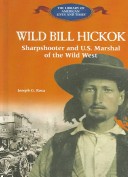Library of American Lives and Times (Hardcover)
1 total work
Eulogised and ostracised, James Butler Hickok was alternately labelled courageous, affable, and self-confident; cowardly, cold-blooded, and drunken; a fine specimen of manhood; an overdressed dandy with perfumed hair; an unequaled marksman; and a poor shot. Born in Illinois in 1837, he was shot dead in Deadwood only 39 years later. By then both famous and infamous, he was widely known as "Wild Bill". Excavating the reality behind the myth, this text delves into the exploits and ego that defined Hickok, and shows how the man was overtaken by his own legend. Rosa exposes a controversial and charismatic man - army and Indian scout, wagon master, courier, frontiersman, gunfighter, lawman, prospector, addicted gambler, and actor - who was elevated from regional fame to national notoriety by inadvertently being in the right place at the right time. Aggrandized in an 1867 "Harper's New Monthly Magazine" article, Hickok reluctantly embraced his exaggerated role in a far-fetched story that has inspired writers, folklorists and movie moguls. Dime novelists sensationalised him. Biographers praised and criticised.
Gary Cooper portrayed him sensitively, Douglas Kennedy villainously, and Charles Bronson laconically. Howard Keel played him romantically (albeit historically incorrectly) against Doris Day's Calamity Jane. Culminating four decades of research on Wild West legends, this work aims to provide an accurate account of the larger-than-life character whose reported accomplishments - both real and imaginary - in Kansas, Missouri, and the surrounding territory frequently brought him unwanted publicity. Setting the record straight, Rosa exposes some of the deliberate lies that vested Hickok with a "man-killer" reputation he didn't deserve. The book shows that the number of men he killed is probably a lot closer to ten than to the more than 100 he is often credited with. Establishing the role an overzealous press and fortune-seeking dime novelists played in immortalising Wild Bill, Rosa reveals how myths were initiated and perpetuated to glorify the 19th-century frontier. He also illuminates why imaginative accounts of unorthodox heroes continue to skew our understanding of this era of American history.
Gary Cooper portrayed him sensitively, Douglas Kennedy villainously, and Charles Bronson laconically. Howard Keel played him romantically (albeit historically incorrectly) against Doris Day's Calamity Jane. Culminating four decades of research on Wild West legends, this work aims to provide an accurate account of the larger-than-life character whose reported accomplishments - both real and imaginary - in Kansas, Missouri, and the surrounding territory frequently brought him unwanted publicity. Setting the record straight, Rosa exposes some of the deliberate lies that vested Hickok with a "man-killer" reputation he didn't deserve. The book shows that the number of men he killed is probably a lot closer to ten than to the more than 100 he is often credited with. Establishing the role an overzealous press and fortune-seeking dime novelists played in immortalising Wild Bill, Rosa reveals how myths were initiated and perpetuated to glorify the 19th-century frontier. He also illuminates why imaginative accounts of unorthodox heroes continue to skew our understanding of this era of American history.
